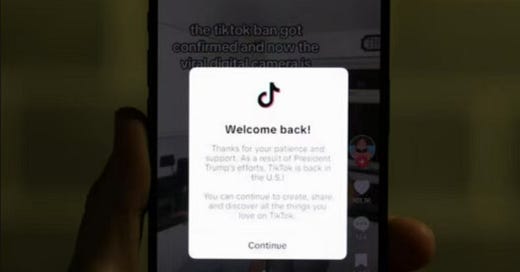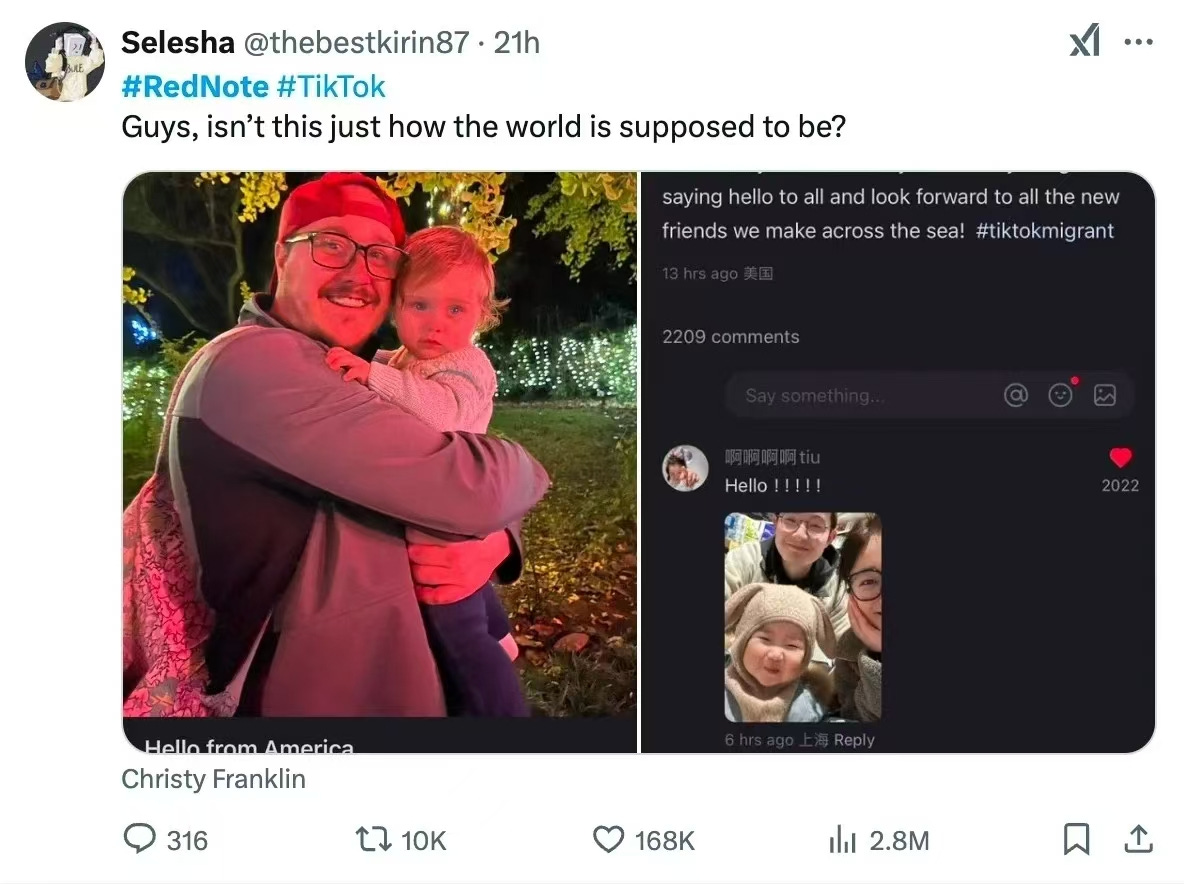
So Long TikTok? Who’s Winning, Who’s Losing, and Who’s Just Confused
America’s favorite source of brainrot survives the chopping block, for now.
Last week’s TikTok debacle was the kind of chaotic, vaguely absurd moment that defines the modern internet. One minute, 170 million Americans had access to the app that revolutionized short-form video; the next, they were signing up en masse for Xiaohongshu, a platform best described as Instagram meets Pinterest with a heavy dose of Chinese internet culture. And then, days later, some of those same users started getting banned for violating Xiaohongshu’s content guidelines.
A perfect loop. The most online among us fled a government crackdown on one Chinese app by jumping to another, only to get hit with that government’s own flavor of censorship.
TikTok has always been an outsider in the American social media ecosystem. While Twitter, Facebook, Instagram, and YouTube have spent years refining their algorithms into an increasingly predictable paste of ad-friendly engagement, TikTok felt unpredictable, chaotic, alive. And that’s exactly why it took years for legacy media, business leaders, and politicians to figure out how to engage with it. Today, more than half of Americans use the platform. It has reshaped not only entertainment but also commerce, cultural trends, and even political discourse.
So what happens if it goes away?
The Winners
Meta, YouTube, and Snap: If TikTok disappears from the U.S., the biggest beneficiaries are the same American tech giants that have spent the past few years scrambling to replicate its success. Instagram Reels, YouTube Shorts, and Snapchat Spotlight were all launched as direct responses to TikTok’s dominance. And while none of them ever quite captured the same magic, the absence of TikTok would almost certainly drive users (and ad dollars) back to these platforms.
Washington’s National Security Hawks: Whether TikTok actually poses a national security risk is debatable, but its ban would be a massive win for those in D.C. who want to decouple the U.S. and Chinese tech ecosystems. The argument has always been that TikTok, owned by China-based ByteDance, could be used as a tool of influence or surveillance by the Chinese Communist Party. That concern isn’t entirely unfounded—China’s internet laws do require companies to cooperate with government requests—but it also raises serious questions about what counts as an acceptable level of risk in a global internet economy.
Oracle: This part hasn’t been discussed nearly enough. Oracle is TikTok’s biggest U.S. cloud partner, hosting vast amounts of the platform’s data on its servers. But Oracle also has deep ties to the U.S. government, and it’s not about to pick a fight with Washington. If the ban is enforced, ByteDance won’t have much of a choice—TikTok's U.S. data infrastructure depends on Oracle, and Oracle isn’t going to ignore a Supreme Court ruling. Whether ByteDance truly intends to fight this, or if it’s just making noise before ultimately divesting, remains to be seen.
The Losers
Small and Mid-Sized Businesses: TikTok isn’t just for dance trends and viral challenges. It’s been a lifeline for thousands of small businesses, many of which wouldn’t exist without it. The platform’s algorithm is eerily good at surfacing niche products to exactly the right audience, making it a powerful tool for independent brands. In 2023 alone, TikTok contributed $5.3 billion in tax revenue to the U.S., driven in large part by small businesses. Those businesses aren’t moving to Instagram Reels overnight.
Creators Who Built Their Careers on TikTok: TikTok didn’t just create a new type of content; it created a new type of creator. Many of the biggest influencers on the platform built their followings from scratch, in a way that wasn’t possible on older social networks. While some will successfully migrate to YouTube or Instagram, others will struggle to rebuild their audience in an ecosystem that isn’t designed for discovery in the same way.
The Idea of an Open Internet: TikTok has been operating in the U.S. for seven years. If it was truly a national security threat, why is it only now facing an existential crisis? The reality is, this sets a precedent. The U.S. government can now ban an app that’s too competitive for Silicon Valley, too popular among young people, or too politically inconvenient. If Washington can justify banning TikTok, what’s stopping a future administration from banning any platform that doesn’t fit its interests?
And it’s not just TikTok that could be at risk. ChatGPT, for instance, is already being discussed in the context of regulation, particularly around misinformation, AI-generated content, and its broader impact on the workforce. If a precedent is set that apps with security or content moderation concerns can be banned, how long before other platforms—whether AI-driven tools or social networks—face similar scrutiny?
The 小红书 Detour
For a brief moment, the chaos of the TikTok ban led to something kind of beautiful. Thousands of Americans flooded Xiaohongshu (“Red Note” though I’ve always preferred “Little Red Book”), where Chinese creators—many of whom also post on Instagram and YouTube—were waiting for them. It was one of the rare moments of direct online interaction between Chinese and American netizens, a reminder that despite political tensions, the internet still has the potential to connect people.
And then, in true Chinese internet fashion, many of those Americans started getting banned. Xiaohongshu is built for China’s heavily controlled online space, and its content moderation rules are very different from TikTok’s. American users quickly learned that what flies on TikTok—or even Instagram—doesn’t always fly on a platform built under Beijing’s watchful eye.
But Xiaohongshu was never going to be a long-term replacement. Its reach is limited, its advertising infrastructure isn’t designed for international businesses, and onboarding a new platform is a huge ask for marketing teams, most of whom have no experience with the Chinese side, much less with the complexity of working directly with foreign entities. Who’s going to pay all the newly minted American 网红?Like most observers, I predict Xiaohongshu is a fun experiment, but not a real shift in the social media landscape. Too bad.
The Bigger Picture
TikTok’s potential ban isn’t just about one app. It’s about the future of the internet. Who gets to control it? What counts as a security threat? How much power should the government have over the platforms people use to communicate, create, and do business? These are the real questions at stake. And regardless of what happens to TikTok, they aren’t going away anytime soon.





